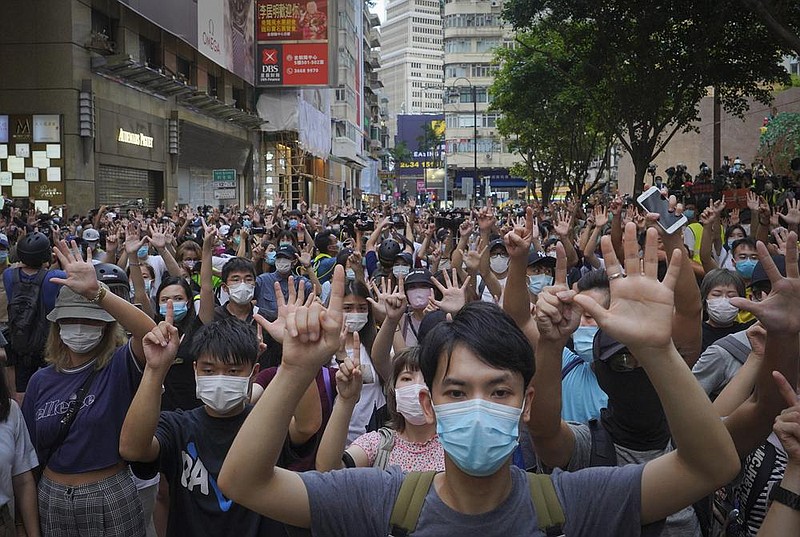LONDON -- Britain announced Wednesday that it was extending residency rights for up to 3 million Hong Kongers eligible for the British National Overseas passport, stressing that it would uphold its historic duty to the former British colony, after Hong Kong police made their first arrests under a new national security law imposed by China's central government,.
Police said 10 people were arrested under the law, including a man with a Hong Kong independence flag and a woman holding a sign displaying the British flag and calling for Hong Kong's independence -- all violations of the law that took effect Tuesday night. Others were detained for possessing items advocating independence.
Foreign Secretary Dominic Raab told lawmakers that amid widespread concerns about Beijing's tightening grip on Hong Kong, the U.K. was changing its immigration rules to give people who are connected to Britain by virtue of the city's status as a former British colony a special route to citizenship.
Eligible individuals from Hong Kong currently can go to the U.K. for six months without having visas. Under the new policy, they will have the right to live and work in the country for five years. After that, they will be allowed to apply for settled status and then again for citizenship.
[Video not showing up above? Click here to watch » https://www.youtube.com/watch?v=adrB5FbbMcE]
Hong Kongers who were born after the end of British rule in 1997 are not eligible, meaning that in effect, many of the city's young student activists who are most at risk of arrest under the new law cannot take advantage of the British offer.
The announcement came hours after China imposed a new national security law in Hong Kong that Britain calls a flagrant breach of China's international obligations and a "clear and serious violation" of the Sino-British Joint Declaration.
That treaty paved the way for Hong Kong's handover from British to Chinese rule in 1997, and was supposed to guarantee at least 50 years of Western-style rule of law and civil liberties for the city under a "One Country, Two Systems" principle until 2047.
Chinese officials have in the past referred to the document as a "historical document," a claim that Britain strongly rejects.
"The prime minister and the government are crystal clear that the United Kingdom will keep its word," Raab said.
The U.K. introduced a special, limited type of British nationality in the 1980s for people who were a "British dependent territories citizen by connection with Hong Kong." The passports did not confer nationality or the automatic right to live and work in Britain, but entitled holders to consular assistance from U.K. diplomatic posts.
Raab called the security law a "grave and deeply disturbing step," and said it contained measures that directly threaten the judicial independence, and freedoms of speech and protest protected by the Joint Declaration. It was particularly concerning that mainland Chinese authorities can now take jurisdiction over some cases without independent oversight, and try those cases in Chinese courts, he said.
The security law makes secessionist, subversive, terrorist activities and foreign intervention in Hong Kong's affairs illegal. The most serious offenders, such as those deemed to be masterminds behind the crimes, could receive a maximum punishment of life imprisonment.
Hong Kong police said on Facebook that they arrested some 370 people on various charges, including unlawful assembly, possession of weapons and violating the new law.
Wednesday's arrests came as thousands took to the streets on the 23rd anniversary of Britain's handover of Hong Kong to China in 1997. For the first time, police banned this year's annual march. Protesters shouted slogans, lambasted police, and held up signs condemning the Chinese government and the new security law.
[Gallery not loading above? Click here for more photos » arkansasonline.com/72hongkong/]
Information for this article was contributed by Zen Soo, Johnson Lai and Wayne Zhang of The Associated Press.






